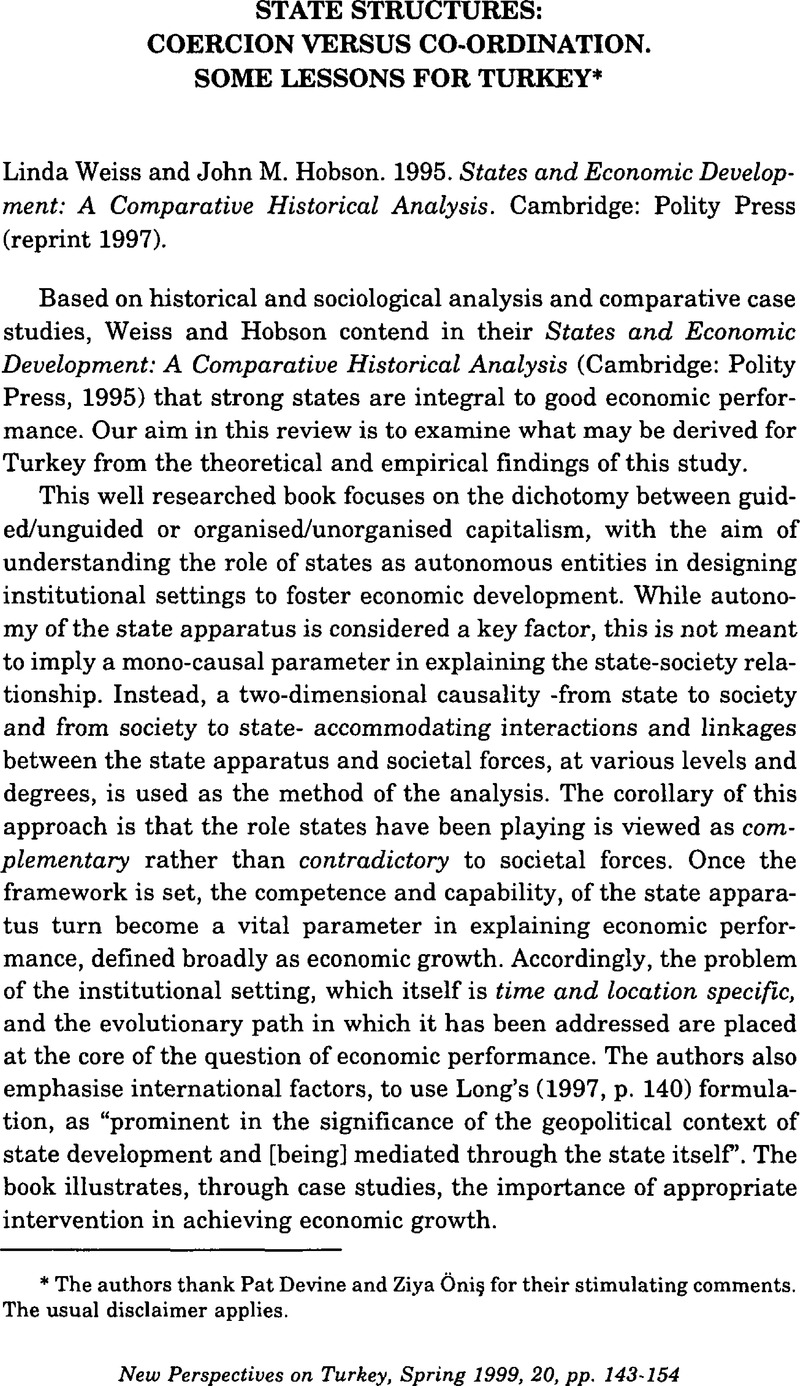No CrossRef data available.
Article contents
State Structures: Coercion versus Co-ordination. Some Lessons for Turkey*
Review products
WeissLinda and HobsonJohn M.. 1995. States and Economic Development: A Comparative Historical Analysis. Cambridge: Polity Press (reprint 1997).
Published online by Cambridge University Press: 21 July 2015
Abstract
An abstract is not available for this content so a preview has been provided. Please use the Get access link above for information on how to access this content.

- Type
- Review Articles
- Information
- Copyright
- Copyright © New Perspectives on Turkey 1999
Footnotes
*
The authors thank Pat Devine and Ziya Öniş for their stimulating comments. The usual disclaimer applies.
References
Amin, A. and Thomas, D. 1996. “The Negotiated Economy: State and Civic Institutions in Denmark,” Economy and Society, 25(2), pp.255–281.CrossRefGoogle Scholar
Adaman, F. and Sertel, M.R. 1997. “The Changing Role of the State: the Turkish Case,” in Handoussa, H. (ed.), Economic Transition in the Middle East, Cairo: American University in Cairo Press, pp. 167–182.Google Scholar
Bhagwati, N.J. 1982. “Directly-Unproductive Profit-Seeking (DUP) Activities,” Journal of Political Economy, 90, pp. 988–1002.CrossRefGoogle Scholar
Bhagwati, N.J. 1987. “Directly-Unproductive Profit-Seeking (DUP) Activities,” in The New Palgrave: A Dictionary of Economics, London: Macmillan.Google Scholar
Buchanan, M.J. and Tollison, R.D. (eds) 1984. Toward a Theory of Rent-Seeking Society. College Station: Texas A&M University Press.Google Scholar
Buğra, A. 1994. State and Business in Modern Turkey: A Comparative State. Albany: State University of New York Press.Google Scholar
Cadot, O. 1987. “Corruption as a Gamble,” Journal of Public Economics, 33, pp. 223–244.CrossRefGoogle Scholar
Cumings, B. 1998. “The Korean Crisis and the End of ‘Late’ Development,” New Left Review, 231, pp.43–72.Google Scholar
Dore, R. 1997. “The Distinctiveness of Japan,” in Crouch, C. and Streeck, W. (eds), Political Economy of Modern Capitalism: Mapping Convergence and Diversity. London: Sage Publications, pp. 19–32.CrossRefGoogle Scholar
Geddes, B. 1994. Politician's Dilemma. Los Angeles: University of California Press.CrossRefGoogle Scholar
Insel, A. 1996. Düzen ve Kalkınma Kıskacında Türkiye: Kalkınma Sürecinde Devletin Rolü. İstanbul: Ayrıntı Yayınları.Google Scholar
Kelly, G., Kelly, D. and Gamble, A. (eds) 1997. Stakeholder Capitalism. Hampshire: London.Google Scholar
Klitgaard, R. 1988. Controlling Corruption. Berkeley, CA: University of California Press.CrossRefGoogle Scholar
Krueger, O.A. 1990. “Government Failures in Development,” The Journal of Economic Perspectives, 4(3), pp. 9–24.CrossRefGoogle Scholar
Krueger, O.A. 1994. “Economists' Changing Perceptions of Government,” Weltwirtschaftliche Archive, 127, pp. 417–431.Google Scholar
Levine, D.L. and Tyson, L.D. 1990. “Participation, Productivity, and the Firm's Environment,” in Blinder, A.S. (ed.), Paying for Productivity. Washington, DC: Brookings Institute, pp. 183–237.Google Scholar
Long, D. 1997. “Book Review of Weiss and Hobson (1997),” Australian Journal of Political Science, 32:1, pp.139-41.Google Scholar
Olson, M. 1965. Logic of Collective Action. Cambridge, Mass.: Harvard University Press.Google Scholar
Oniş, Z. 1998. State and Market: The Political Economy of Turkey in Comparative Perspective. Istanbul: Boğaziçi University.Google Scholar
Oniş, Z. and Sunar, I. 1992. Sanayileşmede Yönetim ve Toplumsal Uzlaşı. İstanbul: TUSİAD Yayınları.Google Scholar
Sunar, I. 1996. “State, Society, and Democracy in Turkey,” in Mastny, V. and Nation, R.C. (eds), Turkey between East and West. Colorado: Westview Press, pp.141–154.Google Scholar
Sunley, P. 1997. “Book Review of Weiss and Hobson (1997),” Political Geography, 16:5, pp.435-36.CrossRefGoogle Scholar
Wade, R. 1998. “The Asian Debt-and-development Crisis of 1997-?: Causes and Consequences,” World Development, 26:8, pp.1535–1553.CrossRefGoogle Scholar
Weiss, L. and Hobson, J.M. 1995. States and Economic Development: A Comparative Historical Analysis. Cambridge: Polity Press.Google Scholar


